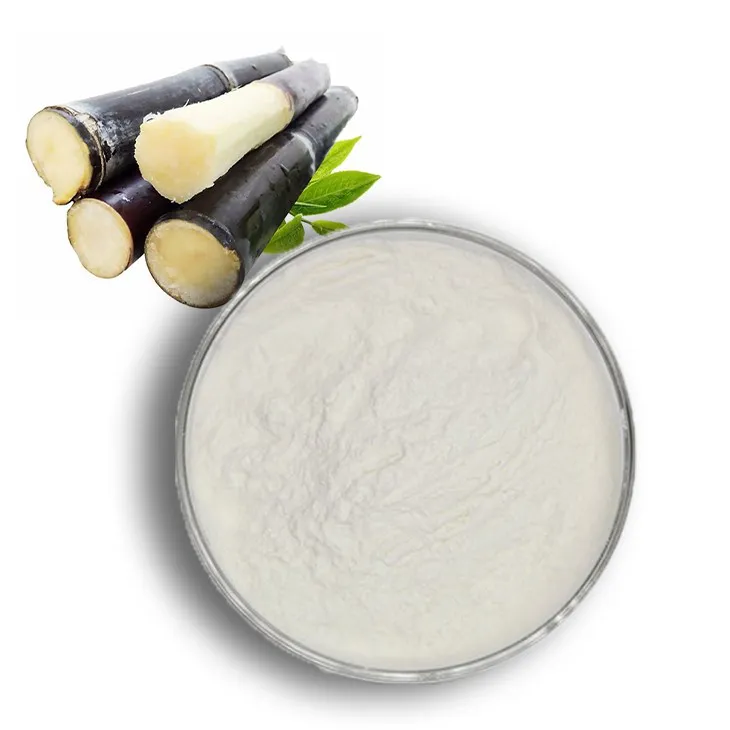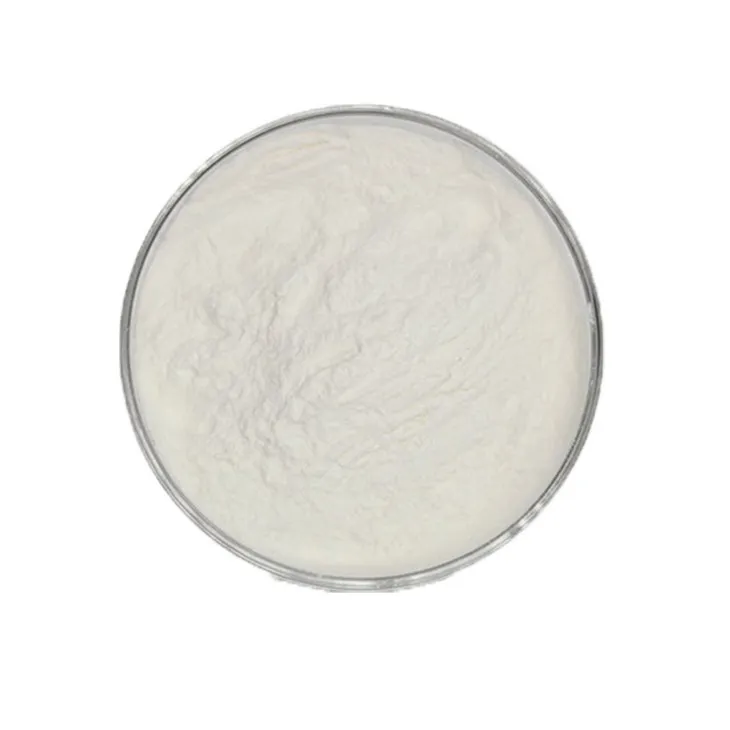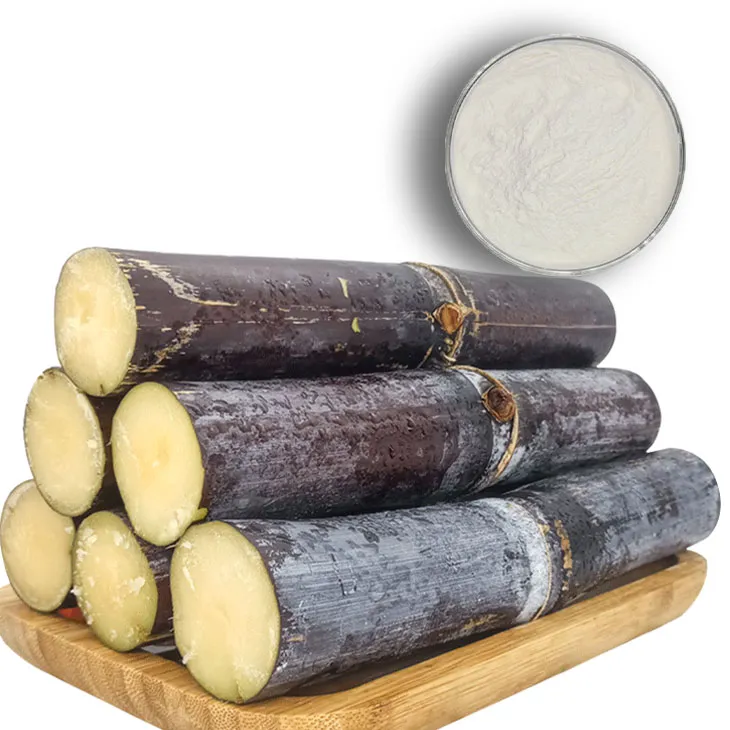- 0086-571-85302990
- sales@greenskybio.com
Organic Sugarcane Extract Powder Suppliers.
2024-11-29

Introduction
Organic cane extract powder has emerged as a highly valuable ingredient in numerous industries. It is not only used for its natural sweetening properties but also for its potential health benefits and other functional characteristics. As a result, the demand for high - quality organic cane extract powder has been on the rise. In this context, identifying the right supplier is a crucial task for businesses that rely on this ingredient. This article will explore the various factors that should be considered when choosing an organic Sugarcane Extract powder supplier.

Environmental and Social Responsibility
Ethical suppliers play a vital role in the organic cane extract powder supply chain. One of the key aspects of their operations is their commitment to sustainable farming practices for sugarcane.
Water Conservation
Sugarcane is a water - intensive crop. Ethical suppliers are aware of this and take measures to conserve water. They may use advanced irrigation techniques such as drip irrigation, which reduces water wastage by delivering water directly to the roots of the plants. By implementing such practices, they not only contribute to the long - term viability of the sugarcane farms but also help in conserving this precious resource.
Soil Protection
Another important aspect of sustainable farming is soil protection. Suppliers who are environmentally responsible ensure that the soil on their farms is well - maintained. This may involve practices such as crop rotation, where sugarcane is alternated with other crops. Crop rotation helps in replenishing the soil nutrients, preventing soil erosion, and improving the overall soil health. Additionally, they may use organic fertilizers and soil amendments to enhance the fertility of the soil without causing harm to the environment.
Fair Labor Practices
On the social front, ethical suppliers adhere to fair labor practices on their farms. This means providing fair wages and safe working conditions for the workers involved in the sugarcane cultivation and harvesting. Workers should have access to proper training, protective gear, and reasonable working hours. By ensuring fair labor practices, suppliers not only contribute to the well - being of the workers but also enhance the overall quality of the product as motivated and well - treated workers are more likely to produce high - quality sugarcane.
Carbon Footprint Reduction
During the extraction and processing phases, suppliers should strive to reduce their carbon footprint. This can be achieved through the use of energy - efficient equipment in the processing plants. For example, using modern boilers that consume less fuel or investing in renewable energy sources such as solar or wind power to run their operations. Additionally, optimizing the transportation of raw materials and finished products can also contribute to reducing emissions. By reducing their carbon footprint, suppliers are not only being environmentally friendly but also meeting the growing demand from consumers for sustainable products.

Product Variety
A good supplier of organic cane extract powder should offer a diverse range of products to meet the different needs of various industries.
Food Industry Requirements
In the food industry, the demand for organic cane extract powder varies. For instance, some food products may require a high - purity grade of the powder for its sweetening properties. This could be used in products like confectionery, where a pure and consistent sweetener is crucial. On the other hand, in some processed foods, a grade with certain additional properties such as a particular flavor profile or a specific solubility may be desired. For example, in some beverages, a grade of organic cane extract powder that dissolves easily and imparts a mild flavor may be preferred.
Cosmetic Industry Needs
The cosmetic industry has its own set of requirements for organic cane extract powder. Here, different grades may be needed depending on the specific application. For skin care products, a grade with certain moisturizing or exfoliating properties may be required. For example, a powder with a fine texture and high content of certain beneficial compounds may be used in facial scrubs or moisturizing creams. Additionally, in hair care products, a grade that can add shine or improve the texture of the hair may be sought after.

Technological Infrastructure
The technological capabilities of a supplier are of great significance when it comes to the production and quality assurance of organic cane extract powder.
Quality Analysis in Modern Laboratories
Suppliers equipped with modern laboratories can conduct in - depth quality analysis of their products. They can test for various parameters such as purity, chemical composition, and microbiological safety. For example, using advanced chromatography techniques to analyze the chemical components of the powder and ensure that it meets the required standards. Microbiological testing is also crucial to ensure that the product is free from harmful bacteria, fungi, or other microorganisms. This level of quality analysis helps in maintaining a consistent product quality and also in meeting the regulatory requirements of different industries.
Production Facilities for Consistent Quality
Modern production facilities are essential for ensuring consistent product quality. These facilities should be designed to optimize the extraction and processing of organic cane extract powder. They may include advanced machinery for crushing the sugarcane, separating the juice, and then converting it into a powder form. For example, using high - pressure extraction methods to obtain a higher yield of the active compounds in the sugarcane. Additionally, proper temperature and humidity control in the production facilities are necessary to prevent spoilage and maintain the quality of the powder.
Custom - Made Solutions for Clients
Suppliers with a strong technological infrastructure can also develop custom - made solutions for their clients. Based on the specific requirements of a client, such as a particular flavor, texture, or functionality, the supplier can modify their production process to create a unique product. For example, if a food company wants an organic cane extract powder with a specific flavor note for a new product line, the supplier can use its technological expertise to develop such a product through techniques like flavor encapsulation or specific extraction methods.

Market Reputation
A supplier's market reputation is a powerful indicator of its reliability and the quality of its products.
Long - Standing Positive Reputation
Suppliers that have been in the industry for a long time and have maintained a positive reputation are more likely to be reliable. A long - standing reputation suggests that they have been able to consistently meet the needs of their customers over the years. This could be in terms of product quality, timely delivery, and good customer service. For example, a supplier that has been operating for decades and has a track record of supplying high - quality organic cane extract powder to major food and cosmetic companies is likely to be a trustworthy choice.
Word - of - Mouth and Industry Awards
Word - of - mouth is a significant factor in building a supplier's reputation. Positive feedback from existing customers can attract new customers. If a supplier is known for its excellent product quality and customer service, other businesses in the industry are more likely to consider it as a potential supplier. Additionally, industry awards also contribute to a supplier's reputation. Winning awards for product quality, innovation, or environmental sustainability can set a supplier apart from its competitors and indicate that it is at the forefront of the industry.
Customer Testimonials
Customer testimonials are another form of evidence of a supplier's good reputation. Testimonials from satisfied customers can provide insights into the quality of the products, the reliability of the supply chain, and the overall customer experience. For example, a testimonial from a well - known food brand stating that a particular supplier's organic cane extract powder has improved the taste and quality of their products can be a strong selling point for the supplier.
Adaptability to Market Changes
In a constantly evolving market, the ability of a supplier to adapt to market changes is crucial.
Evolving Consumer Demands
Consumer demands are constantly changing. For example, there is an increasing trend towards healthier and more natural products. In response to this, suppliers need to be able to adjust their production processes to produce organic cane extract powder that meets these new demands. This could involve developing new grades of the powder with lower sugar content or higher levels of beneficial nutrients. Additionally, as consumers become more conscious about environmental and social issues, suppliers need to ensure that their products and operations are in line with these values.
New Regulations
The introduction of new regulations also requires suppliers to be adaptable. Regulatory requirements in the food and cosmetic industries are constantly evolving. For example, new safety standards for food ingredients or stricter environmental regulations for production facilities. Suppliers need to stay updated with these regulations and make the necessary changes to their operations. This may involve investing in new equipment for quality control or modifying their production processes to meet the new environmental standards.
FAQ:
What should be considered when choosing an organic Sugarcane Extract powder supplier?
When choosing a supplier, factors such as environmental and social responsibility (including sustainable farming practices, fair labor, and carbon footprint reduction), product variety (different grades for various industries), technological infrastructure (modern labs and facilities for quality control and custom solutions), market reputation (stable supply, high - quality products, good customer relations), and adaptability to market changes should be considered.
How can a supplier show environmental and social responsibility?
A supplier can show environmental and social responsibility through sustainable farming practices for sugarcane like water conservation, soil protection, fair labor practices on farms, and by reducing their carbon footprint during extraction and processing.
Why is product variety important in organic Sugarcane Extract powder suppliers?
Product variety is important because different industries such as the food and cosmetic industries have diverse needs. For example, the food industry may need a certain grade for flavoring and sweetening, while the cosmetic industry may require a different grade for skin care products.
What role does the technological infrastructure play in a supplier?
The technological infrastructure of a supplier is significant as it enables in - depth quality analysis to ensure consistent product quality. Also, it allows the supplier to develop custom - made solutions for clients according to their specific requirements.
How can a supplier's market reputation be evaluated?
A supplier's market reputation can be evaluated through word - of - mouth, industry awards, and customer testimonials. A long - standing positive reputation in the industry often indicates a stable supply chain, high - quality products, and excellent customer relationships.
Related literature
- Organic Farming and the Quality of Sugarcane Extracts"
- "Sustainable Suppliers in the Sugarcane Extract Powder Industry"
- "The Role of Technology in Organic Sugarcane Extract Powder Production"
- ▶ Hesperidin
- ▶ citrus bioflavonoids
- ▶ plant extract
- ▶ lycopene
- ▶ Diosmin
- ▶ Grape seed extract
- ▶ Sea buckthorn Juice Powder
- ▶ Beetroot powder
- ▶ Hops Extract
- ▶ Artichoke Extract
- ▶ Reishi mushroom extract
- ▶ Astaxanthin
- ▶ Green Tea Extract
- ▶ Curcumin Extract
- ▶ Horse Chestnut Extract
- ▶ Other Problems
- ▶ Boswellia Serrata Extract
- ▶ Resveratrol Extract
- ▶ Marigold Extract
- ▶ Grape Leaf Extract
- ▶ blog3
- ▶ blog4
-
Bulk purchase of black pepper extract.
2024-11-29
-
Ginger extract of the best quality.
2024-11-29
-
Wholesale Passion Fruit Extract Suppliers.
2024-11-29
-
Organic Genistein, Australia.
2024-11-29
-
Motherwort Extract
2024-11-29
-
Sea buckthorn Juice Powder
2024-11-29
-
Gynostemma pentaphyllum extract
2024-11-29
-
Diosmin
2024-11-29
-
Citrus Aurantium Extract
2024-11-29
-
Calendula Extract
2024-11-29
-
Soy Extract
2024-11-29
-
Mango flavored powder
2024-11-29
-
Beetroot juice Powder
2024-11-29
-
melatonin extract
2024-11-29





















